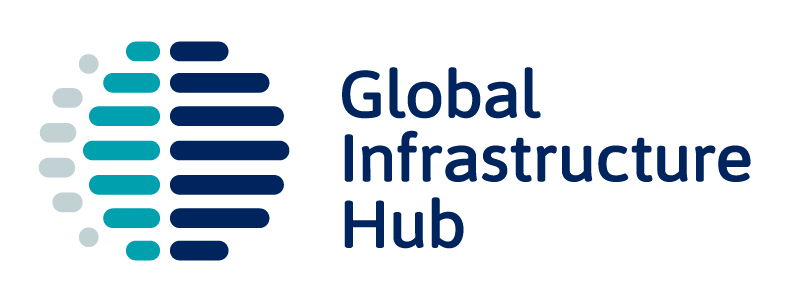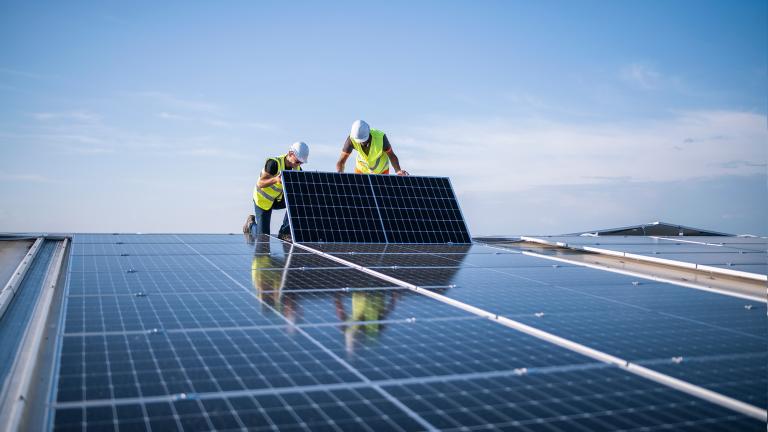Take a moment and imagine your daily life without roads. Everything needed to survive and thrive — food, shelter, employment, medical care, education — would suddenly be difficult or impossible to access. That’s a daily reality for many people in emerging economies, where road networks are undeveloped or unreliable due to poor maintenance.
“In emerging economies, roads can provide access to communities that were not previously connected to services or opportunities,” said Henri Blas, the chief content officer of the Global Infrastructure Hub. Founded in 2014, the GI Hub is a nonprofit dedicated to facilitating sustainable and equitable infrastructure around the world, working to enhance investment and resilience. “When you look at the return on investment from building and maintaining roads, the economic and social benefits can both be considerable,” Blas said.
Roads, however, are expensive: Governments spend roughly $218 billion on them globally each year. Developing countries struggle to finance new road construction or to fund road maintenance, leading to the deterioration or disappearance of vital transport corridors. Simultaneously, emissions from transportation are a substantial driver of climate change. Road travel generates almost 75 percent of transport emissions, and the materials and construction of road infrastructure contribute to greenhouse gas emissions. Asphalt, for example, is a petroleum byproduct. Furthermore, inspection and maintenance vehicles are driven hundreds of thousands of miles across road networks every year. As Amelia Burnett, who works on technology applications in infrastructure at the GI Hub, explained, “There is real tension between the social and economic benefits of roads and their environmental impact.”
Driven by this paradox, the GI Hub launched a program to increase the sustainability of roads in emerging markets. Working with a group of multilateral development bank partners, the GI Hub created a new, more accessible way for developing countries to harness technology on a larger scale to make constructing and maintaining roads less expensive and more sustainable.
The GI Hub decided to build this program around technology solutions, based on feedback from the governments and funders they work with. “After hundreds of hours of conversations, we found a key need kept coming up,” said Burnett. “A lack of knowledge about the costs and benefits of applying technology has meant that some potentially transformative technologies aren’t being adopted.”
The GI Hub uses the term InfraTech, an abbreviation for Infrastructure Technology, to refer to technologies that can help build and maintain cleaner, greener, more affordable infrastructure. These solutions range from smart meters that facilitate water conservation to AI-powered planning to reduce transport emissions. But as they embarked on the program, the GI Hub needed partners with a deep understanding of road projects in emerging markets, to make sure they were meeting the needs of developing economies. To do so, they partnered with multilateral development banks.
As international financial institutions that support and fund development projects in poorer countries, these banks know the challenges and needs of different regions and are key players in infrastructure development. This made them the ideal partners to help identify solutions that would be the right fit for use in developing countries. The program hoped to create opportunities for technology to be adopted on a large scale, rather than simply on a project-by-project basis, helping amplify the long-term impact.
The GI Hub program, meanwhile, helped these banks invest wisely. The African Development Bank, or AfDB, for example, wanted more cost-effective road maintenance. “It is still very difficult to get road maintenance funded in emerging markets,” said AfDB’s transport and logistics division manager, Marco Yamaguchi. “The private sector is less willing to invest in contracts to operate and maintain roads in Africa. To attract them, we need ways to make that investment repay, and technology is one way. When I saw the GI Hub’s program, I knew we needed to get involved.”
Ultimately, the GI Hub was joined by eight multilateral development banks, which collectively operate over every region of the world. Together, the team identified technologies that could make the biggest difference to the sustainability of roads in emerging markets.
After reviewing more than 50 different applications from technology companies, the GI Hub narrowed the field to five technology solutions that could meet road construction, maintenance, and safety requirements while reducing both costs and emissions. One uses AI to provide real-time data on road repair needs, drastically reducing the need for maintenance vehicles to drive the network looking for issues. A second uses high-resolution satellite images to head off potential landslides, and a third is a cutting-edge application that increases the lifespan of asphalt.
“These solutions can be transformative in low-income economies with limited resources,” Burnett said. “What we’ve created is an actionable and replicable process for integrating InfraTech into project development, which any bank could adopt tomorrow.”
The AfDB is already implementing these strategies. One of the biggest infrastructure funders on the African continent, AfDB finances up to $1 billion per year on road projects throughout 54 member countries. Yamaguchi is eager to implement and build upon the GI Hub’s work. He points to the need to maintain life-changing projects like the AfDB-financed Senegambia Bridge, which reduced travel time between The Gambia and Senegal from two days to 10 minutes and dramatically increased trade between the two countries.
Under Yamaguchi’s guidance and with the support of the GI Hub, the AfDB will launch a new Sustainable Roads Maintenance Program for Africa in 2024, which will help maintain roads throughout the continent. “Climate action is one of the highest priority areas for the bank,” he said. “We had already developed the concept, and the GI Hub helped us accelerate the process.”
For the GI Hub’s Blas, this program is just a beginning. “It’s not fair or practical to stop building roads in emerging markets, so instead we aim to make that infrastructure more sustainable,” he said. “We need to do the same for all infrastructure, and technology is key to the transformation.”
He envisions a global knowledge hub for InfraTech solutions, expanding beyond transportation to sectors like waste and water. He also emphasized the need for data, saying it’s key for governments and the private sector to align their objectives and co-invest. Only then, he said, can investment grow at scale.
“By showing the policies and practices that led to investment, we can help others replicate those solutions in other countries and on other projects. That’s the ultimate goal — it’s purpose-driven progress through collaboration.”
The Global Infrastructure Hub, or GI Hub, is a not-for-profit organisation, formed by the G20, that advances the delivery of sustainable, resilient, and inclusive infrastructure.





